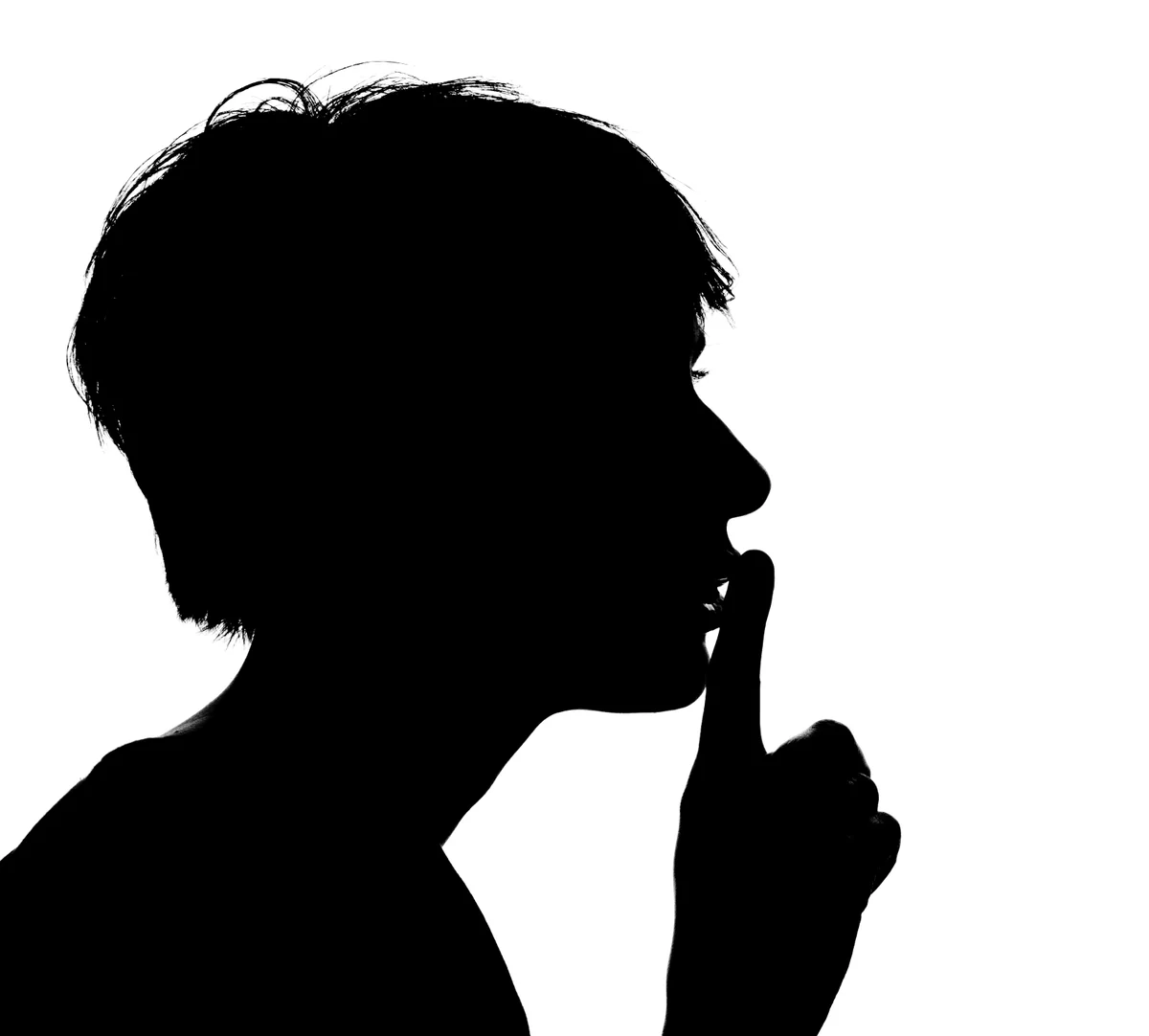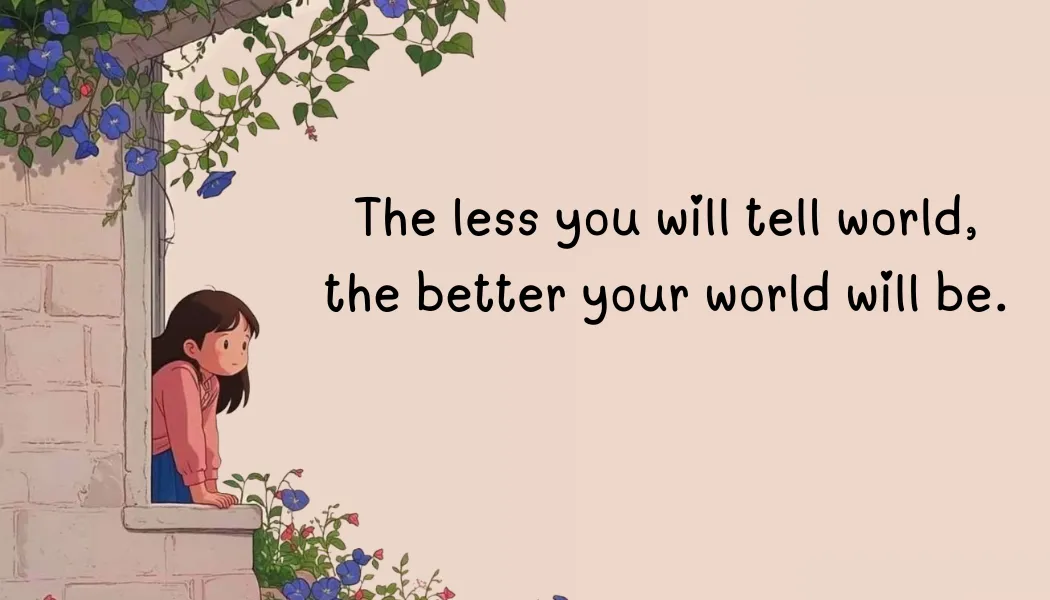In a world that thrives on sharing, documenting, and broadcasting every moment, the concept of privacy has become rare. Social media platforms encourage us to post our achievements, our failures, our relationships, and even our daily meals. Modern culture subtly tells us that our worth is tied to how much we share and how others respond to it. Yet, the timeless wisdom captured in the phrase, “The less you will tell the world, the better your world will be,” reminds us that silence, discretion, and privacy can be powerful forms of protection for our peace of mind.
Guarding our personal world does not mean hiding in fear or refusing to connect. It means drawing boundaries—choosing what to share, when to share it, and with whom. By doing so, we protect our mental health, nurture our relationships, and create a world that feels safe, authentic, and fulfilling. This article explores the value of privacy in today’s oversharing society, why silence is empowering, and how living a more private life can lead to greater peace, success, and happiness.
Table of contents
- The Age of Oversharing
- Why Silence Strengthens Your World
- The Psychology of Privacy
- The Spiritual Perspective
- Things You Should Keep Private for a Better Life
- Silence and Success: Why Privacy Fuels Achievement
- The Link Between Privacy and Mental Health
- How to Build a More Private World
- Common Misconceptions About Privacy
- Real-Life Examples of the Power of Privacy
- The Balance: Privacy Without Isolation
- Conclusion
The Age of Oversharing
With the rise of digital platforms, oversharing has become normalized. People post details of their personal struggles, financial situations, and relationships online, often without considering the long-term consequences. While sharing can build community and foster empathy, it also comes with risks:
- Judgment and Criticism – The more you reveal, the more space you give others to judge or criticize.
- Loss of Control – Once information is shared, it no longer belongs to you—it can be spread, twisted, or used against you.
- Comparison Trap – Sharing constantly often invites unhealthy comparisons, fueling insecurity and anxiety.
- Vulnerability to Negativity – Not everyone wishes you well; sharing too much can attract envy, gossip, or sabotage.
When your private life is too exposed, your mental and emotional well-being becomes fragile. Protecting your world requires intentional discretion.
Why Silence Strengthens Your World
There is immense power in keeping parts of your life private. Silence can feel uncomfortable in a world that demands noise, but it strengthens your inner self.
- Energy Conservation: Explaining yourself repeatedly drains energy. When you keep things private, you protect your strength.
- Mystery Builds Respect: People are naturally more curious and respectful toward those who don’t reveal everything.
- Peace of Mind: Privacy reduces drama and misunderstandings because fewer people are involved in your personal affairs.
- Freedom to Grow: When your dreams and goals are private, you have the freedom to grow without external pressures or unsolicited opinions.
The Psychology of Privacy
From a psychological perspective, privacy is essential for well-being. Studies show that maintaining boundaries around personal life reduces stress and improves focus. Here’s why:
- Autonomy: When you keep aspects of life private, you exercise control. This autonomy fosters confidence and inner strength.
- Reduced Social Pressure: The fewer people know about your struggles, the less pressure you feel to perform, impress, or conform.
- Selective Vulnerability: Sharing only with trusted individuals ensures you receive genuine support rather than empty opinions.
The Spiritual Perspective
Many spiritual traditions encourage silence and discretion. In Buddhism, silence is seen as a form of wisdom. In Christianity, humility is tied to keeping acts of kindness and devotion private. Ancient Stoics, too, advised keeping emotions and goals guarded to prevent external influence.
The principle is universal: protecting your inner world allows it to flourish. When your life is less exposed, it becomes richer, stronger, and more grounded.
Things You Should Keep Private for a Better Life

1. Your Personal Goals
When you announce goals too soon, you may lose motivation. Sharing invites unnecessary pressure and potential discouragement from others. Work silently, and let success speak for itself.
2. Your Financial Situation
Whether you’re thriving or struggling, money should remain private. Talking about finances often attracts envy, judgment, or exploitation.
3. Your Relationships
The most intimate parts of your relationships should be sacred. Oversharing about your partner or family creates unnecessary opinions from outsiders. Protect love by keeping it private.
4. Your Acts of Kindness
True kindness is humble. Broadcasting every act of generosity turns it into performance rather than sincerity. Silent kindness is the purest form of giving.
5. Your Struggles
Sharing vulnerabilities with the wrong people can lead to gossip or exploitation. Instead, share struggles selectively with trusted mentors, therapists, or close loved ones.
Silence and Success: Why Privacy Fuels Achievement
Many successful people practice discretion. They work in silence and reveal results only when ready. Why?
- Avoiding Early Criticism – New ideas are fragile. Privacy shields them from negativity.
- Protecting Focus – Less explaining means more energy devoted to progress.
- Maintaining Surprise – Revealing achievements after they are complete has greater impact.
By keeping your plans private, you safeguard your dreams from being derailed.
The Link Between Privacy and Mental Health
Anxiety often stems from overexposure—worrying about others’ opinions, judgments, or expectations. Privacy helps reduce this burden:
- Less Comparison: If fewer people know your path, you compare less and focus more.
- Inner Peace: Protecting your private world creates a safe emotional space.
- Reduced Social Anxiety: Not having to share constantly relieves pressure to perform for others.
Ultimately, privacy nurtures authenticity, allowing you to live for yourself rather than external validation.
How to Build a More Private World
1. Share Selectively
Ask yourself before sharing: Does this add value to my life or someone else’s? If not, keep it private.
2. Limit Social Media Exposure
You don’t have to delete accounts, but be intentional. Share highlights, not intimate details.
3. Set Boundaries with People
Not everyone deserves access to your inner world. Be clear about your boundaries, even with close friends or family.
4. Practice Silent Growth
Learn new skills, work on personal projects, and nurture dreams quietly. Reveal only when necessary.
5. Value Solitude
Solitude strengthens your connection with yourself. Take time to reflect privately, away from the noise of the world.
Common Misconceptions About Privacy
- Privacy Equals Secrecy: Privacy is not hiding out of fear; it’s choosing what’s sacred.
- Private People Are Cold or Distant: In reality, private individuals often have deeper, more authentic connections because they share selectively.
- Sharing Everything Builds Trust: Oversharing can actually erode trust if it feels performative. Real trust is built on honesty and respect, not exposure.
Real-Life Examples of the Power of Privacy
- Writers and Artists often create their masterpieces in solitude before sharing with the world. Their privacy protects the creative process.
- Entrepreneurs quietly develop ideas before launching, avoiding premature criticism.
- Leaders often withhold personal details to maintain focus on vision rather than personal drama.
These examples show that protecting your private world doesn’t mean isolation—it means wise management of what you reveal.
The Balance: Privacy Without Isolation
While privacy is powerful, complete withdrawal can lead to loneliness. The goal is not to shut people out but to create balance. Share enough to build authentic connections but maintain boundaries to protect your peace.
A healthy balance means:
- Sharing struggles with trusted confidants, not strangers.
- Celebrating success without boasting.
- Posting highlights online without exposing your entire personal life.
Conclusion
In a noisy world that rewards oversharing, choosing silence is revolutionary. “The less you will tell the world, the better your world will be” is not about secrecy—it’s about wisdom. It’s about creating a safe, peaceful, and authentic space where your goals, relationships, and inner self can thrive without interference.
By protecting your privacy, you gain freedom: freedom from judgment, comparison, and unnecessary drama. You learn to live for yourself, not for the approval of others. And in doing so, your world truly does become better—richer, calmer, and more meaningful.
